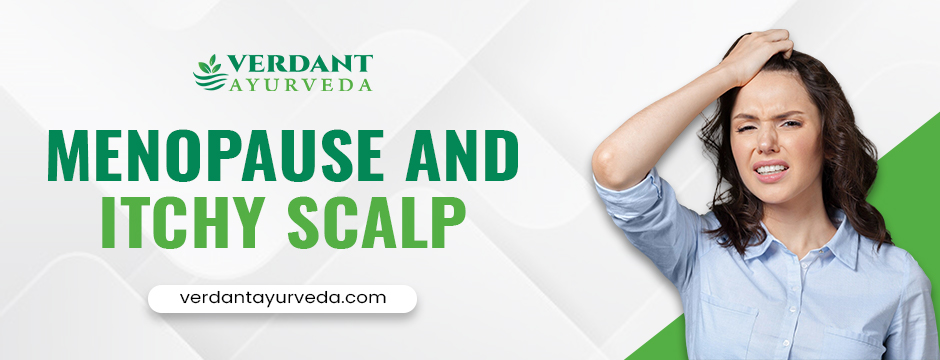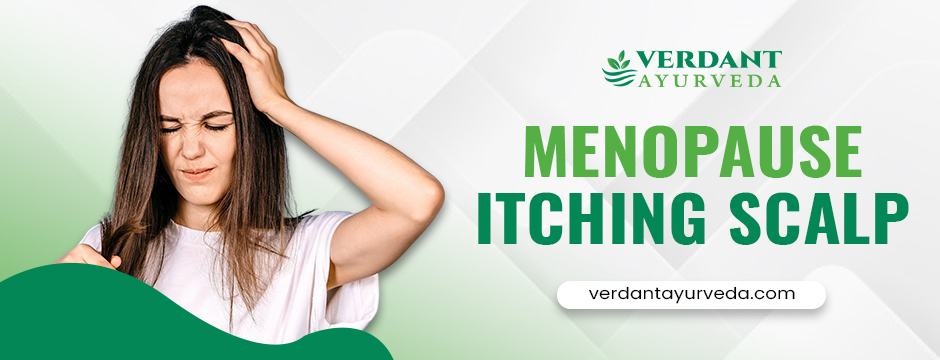
Menopause, a natural biological process, usually occurs between the ages of 45 and 55 and is accompanied by various physical and emotional changes. While hot flashes, night sweats, and mood swings are commonly discussed, one lesser-known yet surprisingly prevalent symptom is an itchy scalp. Many women are baffled when they start experiencing persistent itchiness on their head during menopause, often mistaking it for dandruff or an allergic reaction.
However, hormonal shifts during menopause can profoundly impact skin health, including the scalp. Estrogen, a key hormone that supports the production of natural oils and collagen, begins to decline during menopause. This reduction can lead to dryness, increased sensitivity, and itchiness in various parts of the body, especially the scalp. Understanding the root causes of Menopause and Itchy Scalp and how to manage them holistically is essential for maintaining comfort and well-being during this transformative phase.
What Are The Reasons For Itchy Scalp With Menopause?
Menopause is associated with an itchy scalp because of hormonal changes. Specifically, the decline of estrogen and progesterone. These hormones help to regulate sebum (natural oil) production. If estrogen and progesterone drop, the scalp can become dry and irritated because there is insufficient oil production.
Dryness is a common culprit for an itchy scalp because the scalp is unable to continue protecting itself, and becomes much more sensitive. The dermal layer of the scalp is also unable to retain moisture as it once was, resulting in inflammation. In some cases, women also report itchy scalp conditions like seborrheic dermatitis or scalp psoriasis with hormonal imbalance. The itchy scalp is often a persistent itch that shampooing alone does not relieve.
How to Tell the Difference Between Dandruff & Menopausal Itch?
Dandruff and menopausal scalp itch can appear similar, but they have different causes. On one hand, dandruff can be caused by excess fungi or elements of oily skin disease. Meanwhile, menopausal itch relates to key changes, dryness and hormonal changes. Dandruff will usually produce greasy flakes and can often be treated well with a medicated shampoo.
Menopause and Itchy Scalp will usually produce dry white flakes, and are often resistant to commonly used anti-dandruff medications. A visit to a healthcare provider can provide a proper assessment of the underlying condition to find out if the itchiness is hormone-related or due to some other scalp condition.
Lifestyle Recommendations for Alleviating Scalp Irritation
Besides using natural remedies, there are several ways to adjust your lifestyle to reduce discomfort:
- Drink plenty of water: Hydration is important for the skin. Stay hydrated from the inside out.
- Utilise a humidifier: Humidifiers can help maintain moisture in your skin and scalp, particularly in dry climates or during the winter months.
- Stay away from hot showers: Use lukewarm water instead.
- Use gentle hair products: Look for sulfate-free and fragrance-free shampoos and conditioners.
- Practice stress reduction: High levels of cortisol worsen inflammation waste and dryness. Practicing yoga, meditation, breathing exercises, etc. are all helpful.
Natural Remedies for Scalp Itch During Menopause

Some effective natural remedies can be used to ease and heal an itchy scalp that occurs during menopause:
- Aloe Vera Gel – Aloe Vera is a natural cooling agent as well as moisturizes the scalp. Aloe Vera is also effective in reducing inflammation.
- Coconut Oil – Coconut oil is a natural emollient that helps to naturally seal moisture, prevents fungal infections and can be used as a scalp mask leaving on overnight.
- Apple Cider Vinegar Rinse – Apple cider vinegar’s pH balancing and anti-inflammatory properties can provide a soothe to itching as well as break down build up from products.
- Herbal Hair Oils – Use hair oils that contain Ayurvedic ingredients such as neem, bhringraj or brahmi that nourish the scalp, alleviate dry scalp conditions and promote overall scalp and hair health.
- Oatmeal Scalp Treatments – Colloidal oatmeal can soothe any irritation that promotes itchy scalp and helps restore the natural barrier of the scalp.
All of the above remedies for menopause itching scalp are free of harsh chemicals and can be added to your routine self-care to help maintain a healthy scalp and hair during menopause.
Final Notes
An itchy scalp during menopause can be frustrating, but it’s a manageable condition once you understand its hormonal origins. Embracing a gentle, natural approach to hair and scalp care can bring both relief and restoration. At Verdant Ayurveda, you’ll find holistic online consultations rooted in ancient Ayurvedic wisdom, tailored specifically to support women through every stage of life, including menopause.
From herbal scalp oils to soothing Menopause and Itchy Scalp, we provide effective strategies and tips nourish your scalp, balance your doshas, and promote inner harmony. Don’t let menopausal changes control your comfort—choose us for a balanced, itch-free journey through midlife. Check our website & get relief from your itchy scalp with the specialized consultations.
